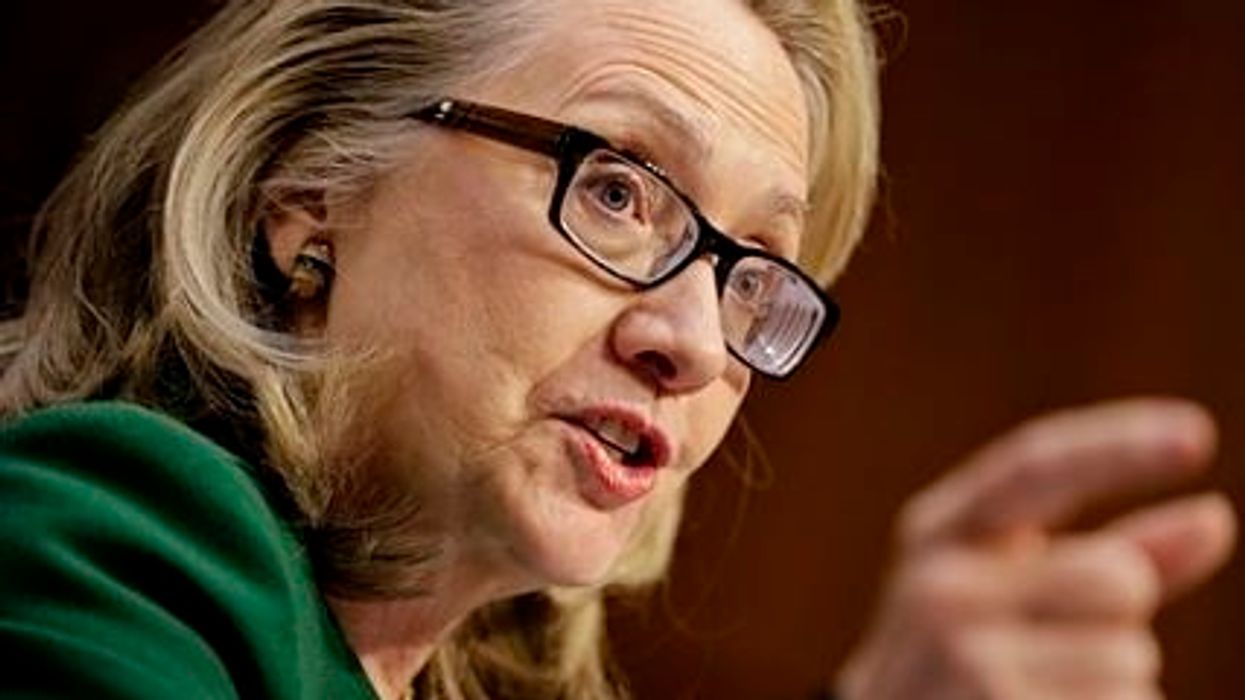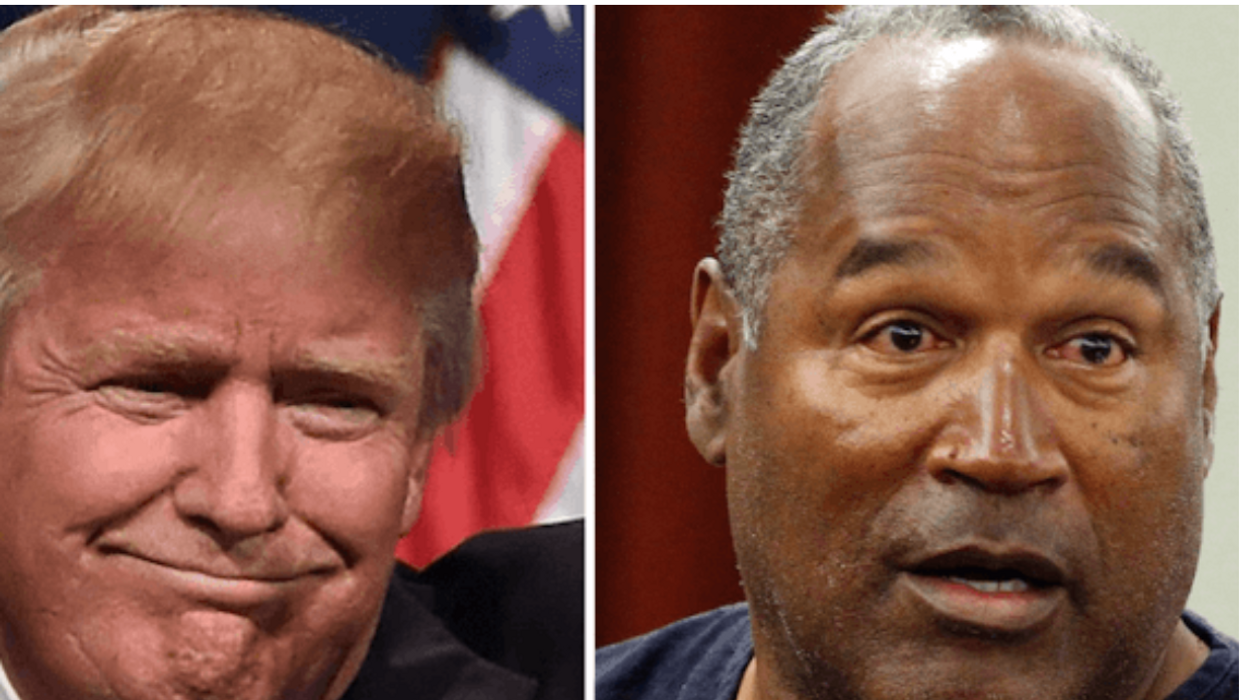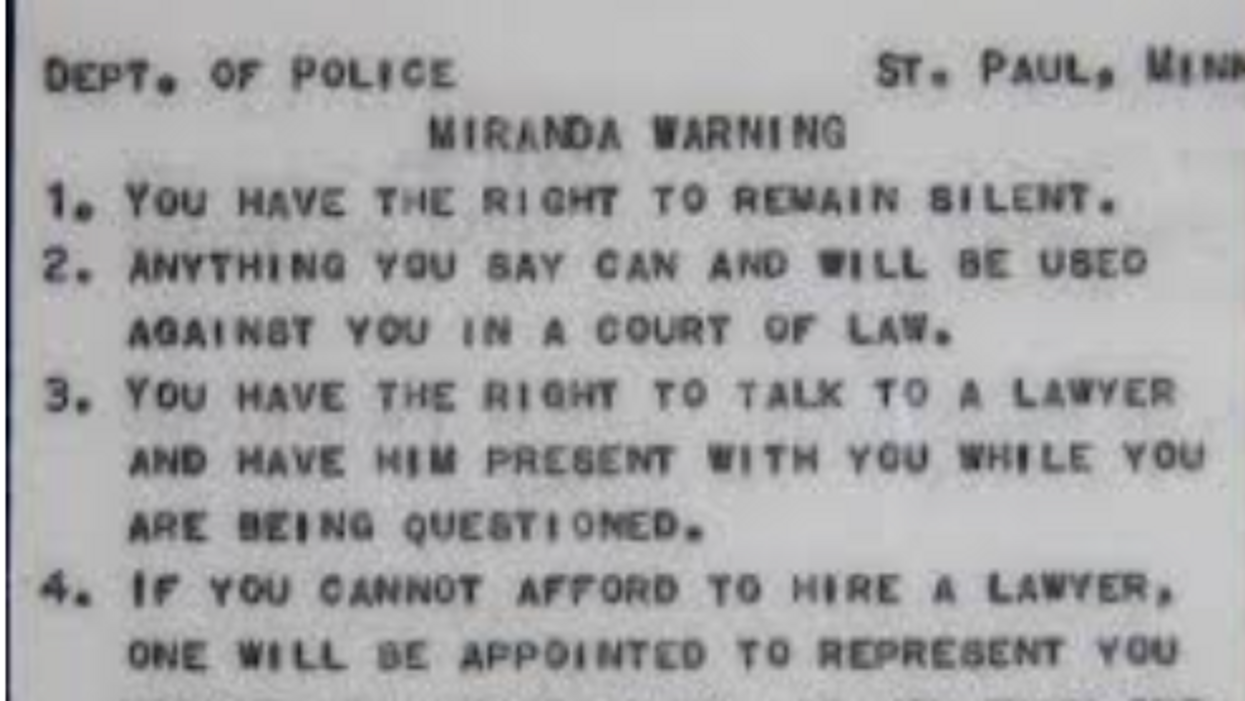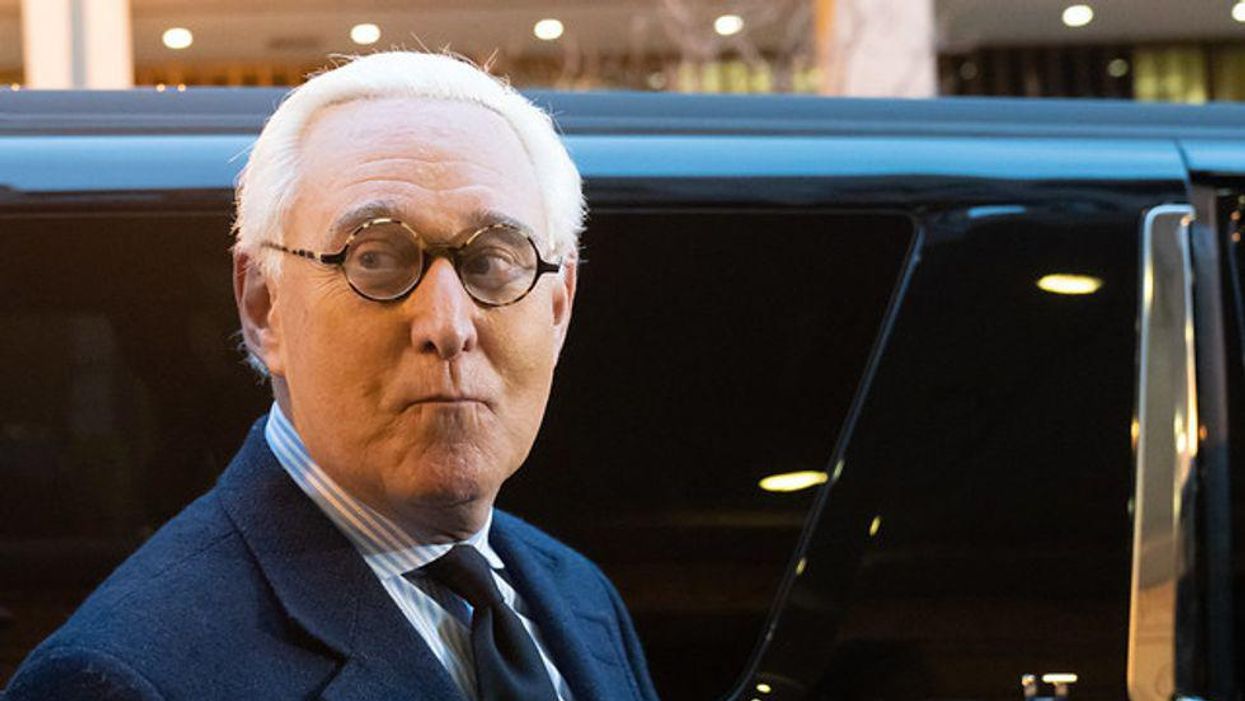“This is sad, O.J.” That’s what Ron Shipp, a police officer and friend of O.J. Simpson, said on the stand at Simpson’s murder trial when he learned the defense was trying to suggest that the former football player was framed.
Donald Trump has often been compared to Benito Mussolini, George Wallace and Richard Nixon, with the last two, at least, looking a little better than he does on close inspection. Now add O.J., who — like Trump — tried to cover his guilt with the time-honored approach of so many defendants: by blaming the police.
OK, Trump hasn’t killed anyone (unless you count the roughly 200,000 coronavirus deaths that could have been avoided had he urged masks and vaccination.) But if he did shoot someone on Fifth Avenue, his cult followers would rally around him at approximately the same decibel level as they have in the days since the FBI searched Mar-a-Lago on Monday.
The torrent of attacks on the FBI and Democrats is not likely to subside much, even after the release of the warrant Friday (a preemptive move by Trump World), which included clear probable cause. We learned that the former president had refused to comply with a subpoena for highly-classified documents that he was hoarding at home. At a minimum, Trump failed to secure nuclear secrets from the prying eyes of the many spies posing as lounge lizards and visiting suck-ups at his club. House Republicans cancelled a press conference after the attack on the FBI office in Cincinnati by a January 6 insurrectionist (later killed by authorities), but they’ll be back on the warpath soon enough, however dangerous their incitement might be. On Friday night, their despicable leader released the names of the FBI agents who searched his mansion, painting a MAGA target on their backs.
Trump’s “Free O.J.!” mob is following a preposterous script. The liars and enablers who make up today’s GOP are trying to cast Attorney General Merrick Garland — the straightest of straight arrows— in the improbable role of Mark Fuhrman, a cop who became more despised during the 1994 O.J. trial than the murder suspect himself. See, Garland is worse than Trump! Meanwhile, Newt Gingrich, Rand Paul, Jesse Watters and other Trump lackeys now claiming evidence was “planted” at Mar-a-Lago are doing their best imitations of Simpson’s facile attorney, the late Johnnie Cochran, though that is terribly unfair to Cochran.
Let’s just uproot the “planted evidence” argument for a moment. It’s being spread now by Trump himself, a sign that he’s worried about the evidence the FBI has gathered. It goes without saying that his conspiracy-addled cult followers will keep peddling this lie for years. In the O.J. case, Cochran implied that Fuhrman or some other racist and crooked cop planted a bloody sock and a bloody glove and a bloody footprint from a Bruno Magli shoe at the murder scene and in Simpson’s house. This was far-fetched during the Simpson trial but it’s downright plausible compared to what would be required to plant evidence in the Mar-a-Lago case—evidence, of course, that had already been, uh, “declassified”.
Imagine what the FBI would have to do to frame Trump. It’s a helluva lot harder than, say, planting drugs on an 18-year-old Black kid in a bad neighborhood, a crime that is more common than most people assume. Corrupt FBI technicians would somehow have to forge highly-classified documents about nuclear weapons that would then have to stand up in court as authentic. Easy-peasy!
That’s about as much juice as I can squeeze out of O.J. Fortunately there are many other takeaways from last week’s stunning developments:
On the basic question of what motivated the search, I’m of two minds. Since 2015, I’ve operated on the assumption that whenever you think Trump has touched bottom, he crashes through the floor. Given that everything else about him ends up even worse than it first appeared, this would suggest that the documents will turn out to contain Trump’s hand-written notes on the coup plot, his betrayal of the United States at the 2018 Helsinki summit with Vladimir Putin, or (and!) his apparent determination as far back as 2019 to transfer nuclear technology to Saudi Arabia. Now that he’s out of office and his family is making multi-billion dollar business deals with the royal family in Riyadh, the last of these might be the most likely scenario.
At the same time, there’s a lot to suggest this really is just about mishandling classified material—an offense the government has always taken very seriously, and which DOJ argues in the warrant violates not only the Presidential Records Act but possibly the Espionage Act and statutes on obstruction of justice. Trump and his flunkies are already insisting that as president he had the power to issue a “standing order” declassifying even nuclear secrets without going through any “bureaucratic” process. Nuclear secrets—no biggie. Who cares if some deep state types say this release of this information would pose an “exceptionally grave” threat to national security? Expect to hear that fatuous claim about 5,000 times on Fox in the next couple of years, then again in court.
Could Garland, famous for playing it by the book, have merely been enforcing a subpoena from last spring for the boxes of documents belonging to the government that Trump was refusing to hand over? Now that the secrets are safe, might he call it a day on Trump’s failure to protect them? Possibly so, though it’s more likely the still-sealed government affidavit that accompanied the warrant includes something less “stale,” as prosecutors put it.
William M. Arkin, an intelligence expert and great reporter I know and trust, writes that two sources tell him that there was a “mole” at Mar-a-Lago. The Wall Street Journal confirmed that “someone familiar with the stored papers told investigators there may be still more classified documents at the private club after the National Archives retrieved 15 boxes earlier in the year.” That—not a “weaponized” DOJ—is what precipitated the search warrant.
Trump claims to be buoyed by supporters rallying behind him but he’s got to be worried about exactly what’s in those 27 additional boxes removed on Monday. One of them contained material on Roger Stone and his pardon. Might there be something else in Stone’s files that implicates Trump? Michael Cohen, Trump’s onetime fixer, told CNN that his old boss no doubt “feels trapped” and is worried that the source Trump calls a “rat” (spoken like true mobster) has more dirt on him.
Many commentators across the spectrum this week thought that mishandling and withholding classified material was too small a crime to justify prosecuting Trump — as if anything short of the former president committing treason did not justify enforcing the law; as if the Feds in the 1930s should not have prosecuted Al Capone for something as minor as income tax evasion. Really? Law enforcement should retreat in the face of partisan noise and threats of violence?
In my cable news gorging this week, it felt as if many of the same analysts saying that Garland was too aggressive if he didn’t have something earth-shaking were claiming a month ago that he wouldn’t be aggressive enough. The only thing that changed was the simultaneously terrifying and tiresome cannonade from the GOP. It intimidated a surprising number of people into accepting Trump’s frame on the story—until Garland, late in the week, turned the tables.
But of course the carnival of hypocrisy will never close. Trumpsters don’t oppose all law enforcement, only the investigations aimed at them. They’re against defunding the police until they’re for defunding the FBI.
It was only six years ago that Trump got elected in part by harping on Hillary Clinton’s emails, which might have contained classified information unsecured on her private server. He said the issue was disqualifying and delegates to the Republican National Convention — the same people making excuses for him today — chanted ominously: “Lock Her Up!”
Sometimes the hypocrisy is so bald even Trump can’t ignore it. “I once asked [not “once,” about 50 times], ‘If you’re innocent, why are you taking the Fifth Amendment?’” he said after pleading the Fifth more than 400 times on Wednesday in a deposition in a civil suit brought by New York Attorney General Letitia James. “Now I know the answer to that question.”
As it happens, Trump was correct the first time, though no president should trample on any constitutional right. In civil cases, it’s permissible for a jury to infer guilt from a defendant taking the Fifth. Which is why Trump is likely to owe millions in civil judgments stemming from his financial shenanigans.
In the meantime, the braying of the asses continues unabated. “This is the worst attack on the republic in modern history—period,” the powerful radio host Mark Levin thundered on Fox News. How so, Mark? Because it is “unprecedented”? (A word that newscasters this week turned into a pejorative.)
Kevin Williamson, an anti-Trumpist, had a good response to that in the National Review:
“The FBI’s serving a search warrant on Donald Trump’s residence is not — in spite of everything being said about it — unprecedented. The FBI serves search warrants on homes all the time. Donald Trump is a former president, not a mystical sacrosanct being.”
If we really believe, as we say we believe, that this is a republic, that nobody is above the law, that the presidency is just a temporary executive-branch office rather than a quasi-royal entitlement, then there is nothing all that remarkable about the FBI serving a warrant on a house in Florida.”
Rep. Elise Stefanik (R-NY) and the others demagoguing the issue all know better. They know the FBI search did not break or even bend the law. It was the temerity of it that they thought, rightly, would be red meat for the base — the very idea that anyone would dare hold their Dear Leader to account. We’re all so inured to rightwing nonsense that Sen. Rick Scott (R-FL) comparing the FBI to the Gestapoflies right past us—as if executing a search warrant is the same as executing six million Jews.
Fortunately, Garland is genuinely non-political, which means he won’t let the political assessment of how his prosecution is “playing” impede his efforts. In fact, the most important — and gratifying — conclusion we can draw from the Mar-a-Lago search is that the long debate over the intentions of the attorney general — does he have the intestinal fortitude to prosecute Trump? — is over. He may not be a flashy hard-charger, but his steady, implacable will to push back against outrageous intimidation and uphold the rule of law — wherever that might lead — is now on the display for the whole world.
On Thursday, Garland skillfully called Trump’s bluff that the attorney general would stay silent while the former president controlled the media narrative. All week, it bothered me that even some good reporters and interviewers fell for Trump’s ferocious spin, and imposed a double-standard that conjured 2016 and boded ill for 2024. I wasn’t alone. Ben Rhodes, a former Obama speechwriter, tweeted:
If Garland’s seriousness about holding Trump to account was the best news of the week, the worst news was how Republicans closed ranks around the former guy. I’m not worried about it in terms of the midterms. The Republicans enraged by the Mar-a-Lago “raid” were already certain to turn out for Republican candidates. It’s hard to imagine swing or sporadic voters (those who usually avoid midterms) coming out in droves because Trump is playing the victim card again.
But this episode may make it more likely that Trump will be the Republican nominee in 2024. It gives him something to talk about other than the “stolen” 2020 election, which was boring even some of his ardent supporters. As his cult of personality further solidifies, you’ll see Ron DeSantis’ stock heading south.
It’s scary to watch the Kool-Aid going down the hatch. Here’s Matt Schlapp [Chairman of CPAC]:
“It’s an unshakable bond. People ask the question—Is he the leader? .. Yes, and I think he will be until he takes his last breath.”
His last breath — in the bunker? So even if slam dunk evidence emerges that Trump is a traitor, you wouldn’t criticize him, Matt? There are literally NO circumstances where he is not your leader? This isn’t a smitten insurrectionist saying this. Schlapp was George W. Bush’s White House political director. As head of the American Conservative Union and now CPAC, he’s arguably the leading “conservative” (whatever the hell that means nowadays) in the U.S. today. And all he can say is, “Heil Trump!”
The 2020s are not the 1990s, when peace and prosperity allowed us to distract ourselves with low-stakes melodramas like the O.J. Simpson trial. This is not a drill. I don’t think Trump will be reelected; even before January 6, he never cracked 50 percent approval ratings and had alienated broad swaths of independent voters. But history shows anything is possible when you receive the nomination of a major political party. If Trump is the 2024 GOP nominee and we have a severe recession, he can argue how great his economy was from 2017 to 2020, a misleading but plausible claim, and—with the help of election deniers in key states—slip back into the Oval Office. What would happen next is not a liberal fever dream but, according to the chairman of the Joint Chiefs of Staff, a mortal threat to American democracy. This time, Trump would know what he’s doing. Within weeks, the FBI would be transformed from a “deep state” enemy into the new dictator’s secret police. Bet on it.
Jonathan Alter, a political analyst for MSNBC, writes the Old Goats newsletter on Substack. Alter's most recent book is His Very Best: Jimmy Carter, a Life.
Reprinted with permission from Old Goats




